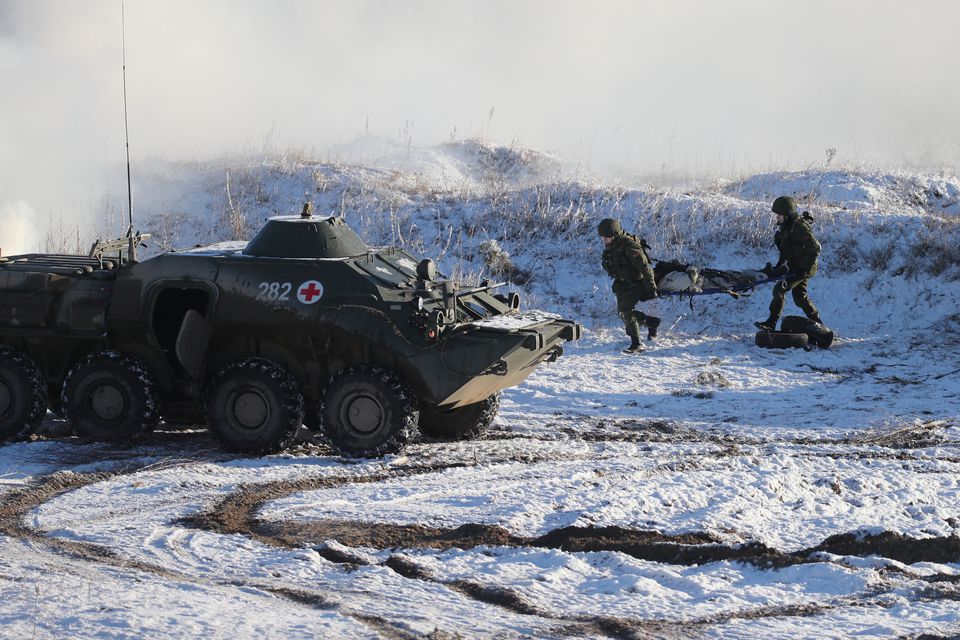The United States said diplomacy could still resolve a standoff with Moscow over Ukraine but added that the risk of a Russian invasion was high enough to warrant pulling U.S. embassy staff out of Kyiv.
U.S. Secretary of State Antony Blinken was speaking after talks on Saturday with Japanese and South Korean counterparts, following Washington’s warning that Russia’s military, which has more than 100,000 troops massed near Ukraine, could invade at any moment. Moscow denies having any such plans.
A flurry of meetings and phone calls in recent days between top Western and Russian officials has produced no sign of a breakthrough to resolve in weeks of escalating tensions.
Germany Chancellor Olaf Scholz is set to meet Russian President Vladimir Putin on Tuesday but a German source said Berlin did not expect “concrete results” from those talks.
Scholz would make clear the West was united and any aggression would prompt “painful, considerable sanctions” on Russia, the source said.
“The diplomatic path remains open. The way for Moscow to show that it wants to pursue that path is simple. It should de-escalate, rather than escalate,” Blinken said In an hour-long call on Saturday, U.S. President Joe Biden told Putin that the West would respond decisively to any invasion of Ukraine, adding such a step would produce widespread suffering and isolate Moscow.
A senior Biden administration official said the call was substantive but that there was no fundamental change.
The Kremlin said Putin told Biden that Washington had failed to take Russia’s main concerns into account and it had received no “substantial answer” on key elements of its security demands.
Putin wants guarantees from the United States and NATO that include blocking Ukraine’s entry into NATO, refraining from missile deployments near Russia’s borders and scaling back NATO’s military infrastructure in Europe to 1997 levels.
Washington regards many of the proposals as non-starters but has pushed the Kremlin to discuss them jointly with Washington and its European allies.
‘HIGH ENOUGH’ RISK
Washington, along with its Western allies and many other countries, ordered most of its embassy staff on Saturday to leave Ukraine immediately due to the threat of an invasion.
“We ordered the departure of most of the Americans still at the U.S. embassy in Kyiv. The risk of Russian military action is high enough and the threat is imminent enough that this is the prudent thing to do,” Blinken said in Honolulu.
Many of Washington’s European allies and others have also been scaling back or evacuating staff from their Kyiv missions and have urged citizens to leave or avoid travel to Ukraine.
U.S. staff at the Organisation for Security and Cooperation in Europe (OSCE) began leaving https://www.reuters.com/world/us/us-staff-osce-begins-pullout-donetsk-eastern-ukraine-2022-02-13 by car from the rebel-held city of Donetsk in east Ukraine on Sunday, a Reuters witness said.
The OSCE conducts operations in Ukraine including a civilian monitoring mission in Russian-backed, self-proclaimed separatist republics in the regions of Donetsk and Luhansk, where a war that erupted in 2014 has killed more than 14,000 people.
An adviser in Ukraine’s presidency, Mykhailo Podolyak, said that regardless of what airlines chose to do Kyiv had no plans to close its airspace as such a move would resemble “a kind of partial blockade.”
After a call on Saturday between French President Emmanuel Macron and Putin, a French presidency official said there were no indications from what Putin told Macron that Russia was preparing an offensive against Ukraine. But the official said Paris remained “extremely vigilant.”
British defense secretary Ben Wallace cautioned against putting too much hope in talks, saying there was “a whiff of Munich in the air from some in the West,” referring to a 1938 pact that failed to halt German expansionism under Adolf Hitler.
“The worrying thing is that, despite the massive amount of increased diplomacy, that military build-up has continued,” Wallace told The Sunday Times of London.




-20260304091720.webp)



-20260303080739.webp)
-20260302065048.webp)

















-20260225072312.webp)





-20260228064648.jpg)
